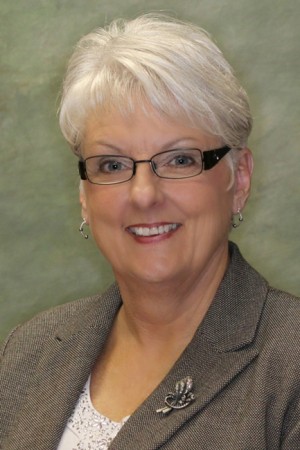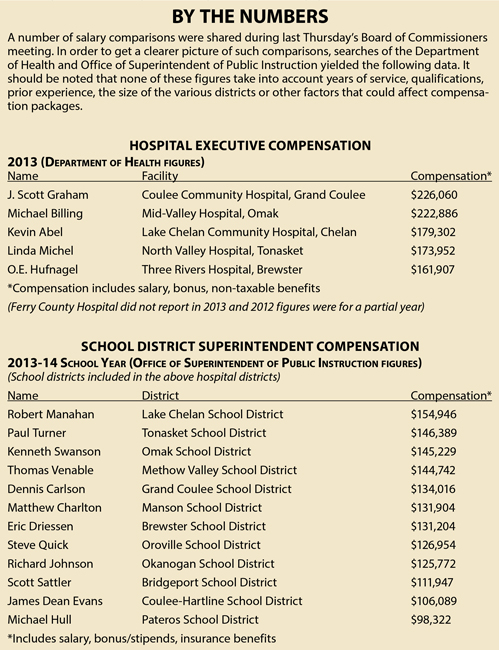CEO cites new round of backlash for early retirement


TONASKET – North Valley Hospital District Administrator Linda Michel tendered her resignation to the NVH Board of Commissioners Thursday, Dec. 11, following a lengthy executive session at the end of that evening’s board meeting.
Michel, who said she had originally planned to retire in Oct. 2015, moved that date up to April 3.
Michel said she would have no public comment at this time, other than the contents of her letter of resignation.
In a letter dated Dec. 4, she cited a the latest round of backlash over her attempts to deal with financial losses of North Valley Assisted Living. At a commissioners’ meeting last month she put forth a plan to form a pair of committees: one to find a way to save the nursing home, and another to determine what steps would be required to close it if such a plan didn’t come to fruition.
Critics have accused Michel, the commissioners and the administrative staff of intending to shut the facility down.
“I am no longer willing to have my integrity or intelligence questioned,” Michel wrote in her letter. “Nor am I willing to watch the Senior Leadership Team – a highly intelligent, moral, caring, and committed team – put through the stress of un-truths and speculation about their intelligence or capabilities. They have sacrificed their most precious gifts, time and family, to make the best recommendations for the District as a whole, with little or no appreciation, but very vocal criticism.”
Michel some of the issues that arose surrounding the closing of North Valley Assisted Living in 2013.
“It was a time of personal accusations, inaccurate information, and unproductive actions against the District, when it was the Governmental Agencies and their reimbursement practices that made such action necessary,” Michel wrote. “These actions put undue stress on the entire staff working for the District. Now with the current estimated financial situation of our 2015 budget, this cycle seems to be beginning again.”
Michel was hired in 2010 with the hospital district nearly $3 million in debt to Okanogan County, and with a directive to remedy the district’s debt obligations. During her tenure NVH has climbed out of debt but no longer has the option of borrowing money from the county.
“I have thus fulfilled my commitment to the Commissioners, and feel that forward movement of the District will be hampered by my presence here as CEO,” she wrote.
Tensions high at board meeting
A number of passionate speeches and statements and questioning by Commissioner Teresa Hughes highlighted a tense Board of Commissioners meeting that focused on the possible fate of the nursing home, as well as opinions on hospital district finances.
Chief Information Officer Kelly Cariker, speaking on his own behalf in the public comment portion of the meeting, asked that all parties concerned about the nursing home and the hospital district as a whole find a way to work together.
“At one point we were $3.8 million in debt,” he said. “We dug our way out, and it wasn’t easy … We don’t do everything right. We’re just human. We’re a smart group of people. We really care about this community …
“There has to be some healing and there has to be some trust. If the community can’t trust the people at this table, we’re not going to be able to save this district, no matter what happens.”
He responded to suggestions that some elective surgeries be sent to other hospitals, saying that it could start a cycle that could result in the loss of services and dozens of jobs.
“Something that seems to make sense in the paper, at first look, can be difficult,” he said. “We’re over an abyss, on a tight rope with a balance pole. Someone said last week it’s Rube Goldberg machine on how we get paid. That’s the truth. If we go upsetting the balance, we’re going to drop into that abyss.
“If you don’t trust us, and if we don’t work together, we’re not going to save this district … we need to be on the same side.”
Kristen Super said that closing the nursing home would cost the hospital as well.
“People will leave the area because they moved here to take care of their family members,” she said. “It will trickle down to the hospital … how many patients use physical therapy, lab, x-ray, other facilities in the hospital? They use the ER a lot too. If we lose that, what are we going to do? Hope the general public gets sick a lot?”
Super suggested putting together a “restructure” committee.
“We will look at who has what job, what their job description is, what their wages are, how many people have been added since Linda got on board, and financial issues as far as how the two facilities are run. I know it can work, absolutely, not a shadow of a doubt.”
Board Chair Helen Casey followed with words of her own.
“We made a committee for a success strategy, not a closure committee,” Casey said. “We appointed Teresa Hughes (to run the committee) and to have people to help. It wasn’t about restructuring. It’s about doing what we need to do to do it right.”
She lauded the work of Michel and her administrative team.
“We were in trouble – big trouble – whether you like it or not,” Casey said. “We were far, far in the whole. We made difficult decisions. They weren’t popular and won’t be. But I have to tell you this group of people have had your best interest all along. You can shake your head and say no, but you’re wrong.”
Casey said that even the possibility of closing the nursing home had “gone viral” but that the district had to be prepared if a plan to save it couldn’t be enacted in time.
“We have things we need to do,” she said. “We need everybody’s help. Everyone has great ideas. But we have to structure it right. It can’t be accusing.
“There was a long time I couldn’t even go out in the community. At the grocery store I was asked if I needed a bodyguard. We shouldn’t have to go there. Anybody in this room shouldn’t have to go there. Being ridiculed for doing the job. I trust and respect Linda for what she has done.”
She repeated that the goal was not to close the nursing home.
“The goal is to provide education to the community and to our legislators: the state and federal government have our hands tied. It’s not something we can do differently,” she said.
Hughes reported on the first meeting of the “Save the Nursing Home” committee and said she felt the committee needed a year to come up with a solution, rather than the March deadline they were initially given.
“The public needs more information on how Medicaid reimbursements are calculated,” she said. “How the district funds are allocated to the Hospital and Long Term Care divisions. They want the nursing home to stay open. This is their facility: this is not a private business. It is a publicly owned entity. I believe the public has spoken loud and clear and we need to find a solution.”
Informational binders, grant and fundraising were being researched, and volunteers for legislative and levy subcommittees were being sought, she said.
“I feel the real elephant in the room is that there weren’t enough internal cuts made before we decided we needed to ‘save the nursing home,'” she said. “This is a public entity, not a private corporation. We need to get the management salaries in line with those in the Tonasket and Oroville area.”
She said that Michel’s salary, which she said was $176,966, was significantly higher than the salaries of the Tonasket and Oroville School District superintendents, which she said were paid $120,000 and $100,000, respectively, and the Tonasket District Ranger’s pay, which she said was between $80-120,000.
She also said that raises given to senior leaders since 2010 would have cut out half of the nursing home’s losses if the monies had been allocated there instead.
“How is it acceptable for a facility that was in warrants to do this?” she asked, calling it “shameful.”
(Editor’s note: the details of administrative raises, as well as cuts to administrative staff, were covered in an extensive article and editorial in the April 4, 2013 issue of the Gazette-Tribune, which can be found online under the “Green Edition” tab at www.gazette-tribune.com.)
Hughes moved to closing the Drip Line cafe, which died for lack of receiving a second; she also questioned the opening of a physical therapy office in Oroville; and suggested that in the 2013 budget/income statement that showed the Long Term Care $300,000 in the black.
“What has changed so drastically?” she asked.
Hughes asked Cariker if it were too late to back out of the continuing with the next phases of the boiler replacement project. The district accepted a $500,000 grant to help with the first phase of the project, completed last year, that was contingent on continuing with the rest of the project.
“Is it too late to consider backing out of that?” she asked. “What is the full cost?”
Cariker said there was about $1.2 million of work left on the project.
“We paid around $600,000,” he said. “The first run was a little over $500,000 and we paid for that out of cash on hand. We received the grant afterwards. That money was put aside to continue on with the project, and we’ve been using it for that purpose.”
During the annual committee appointments, Hughes was placed on the finance committee at her request, serving with Casey, and giving up her spot on the CQI committee with Dick Larson to trade out with Herb Wandler, who had previously served on finance.
Chief Financial Officer Helen Verhasselt also reported that as of Thursday afternoon the district had $159,726 cash on hand and had not been in warrants for 28 consecutive days.
The commissioners next meet on Thursday, Jan. 8.






